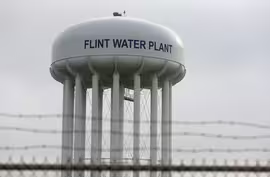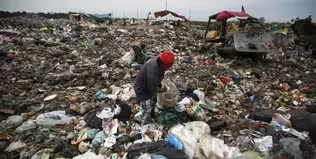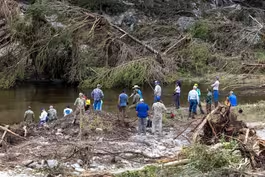
Palestinians describe risking death to get food aid in Gaza
Clip: 7/20/2025 | 6m 23sVideo has Closed Captions
Palestinians describe choice between starvation and risking death to get food aid in Gaza
There are signs that Israel is preparing to expand ground operations into an area of central Gaza that has been a relatively safe refuge for displaced Palestinians and humanitarian aid groups. While the Israeli military issued evacuation orders, at least 85 more Palestinians were reportedly killed while seeking food aid. John Yang speaks with The Wall Street Journal’s Sudarsan Raghavan for more.
Problems playing video? | Closed Captioning Feedback
Problems playing video? | Closed Captioning Feedback
Major corporate funding for the PBS News Hour is provided by BDO, BNSF, Consumer Cellular, American Cruise Lines, and Raymond James. Funding for the PBS NewsHour Weekend is provided by...

Palestinians describe risking death to get food aid in Gaza
Clip: 7/20/2025 | 6m 23sVideo has Closed Captions
There are signs that Israel is preparing to expand ground operations into an area of central Gaza that has been a relatively safe refuge for displaced Palestinians and humanitarian aid groups. While the Israeli military issued evacuation orders, at least 85 more Palestinians were reportedly killed while seeking food aid. John Yang speaks with The Wall Street Journal’s Sudarsan Raghavan for more.
Problems playing video? | Closed Captioning Feedback
How to Watch PBS News Hour
PBS News Hour is available to stream on pbs.org and the free PBS App, available on iPhone, Apple TV, Android TV, Android smartphones, Amazon Fire TV, Amazon Fire Tablet, Roku, Samsung Smart TV, and Vizio.
Providing Support for PBS.org
Learn Moreabout PBS online sponsorshipJOHN YANG: Good evening.
I'm John Yang.
There are signs tonight that Israel is preparing to expand ground operations into an area of central Gaza that's been a relatively safe refuge for displaced Palestinians and humanitarian aid groups.
The Israeli military issued evacuation orders for an area around Deir al-Balah where forces have largely refrained from operating for fear of endangering hostages still held by Hamas.
The orders came as at least 85 more Palestinians were said to have died while trying to get to food aid distribution sites.
The largest toll was in northern Gaza, where people were approaching U.N. aid trucks entering from Israel at the Zikim crossing.
MOHYI AL-ZAYTOUNA, Eyewitness (through translator): We were just going to get food to bring for our children.
We were not going to beg or fight.
We just wanted to eat.
JOHN YANG: Many Palestinians say they have to choose between risking being killed trying to get food or going without.
The U.N. has said that in recent weeks, nearly 900 people had died trying to get aid, mostly near sites run by the private U.S. and Israeli backed Gaza Humanitarian Foundation.
Sudarsan Raghavan is the Wall Street Journal's senior Middle East correspondent.
Sudarsan, we just heard a Palestinian in that introduction talk about what he faced as he tried to get food aid.
I know that you've done some reporting and you have other stories of other personal stories.
What, what can you tell us?
SUDARSAN RAGHAVAN, Wall Street Journal: It's really a Sophie's Choice for most Gazans.
It's a daily stark choice between starvation and then risking death to go through combat zones in order to go to a handful of food distribution points in Gaza.
We spoke with several individuals who faced this choice and it was extremely sad.
We spoke to one woman who had originally was getting food aid from one of the soup kitchens that are still open.
And one day she goes there and she carries her bucket to get the soup and the soup fell on her body, scalding her arms.
When she went back, her son told her never to go again to the soup kitchen.
The very next day, he goes to one of these food disputes centers run by the Gaza Humanitarian Foundation and he was shot dead while he was approaching the site.
There are countless stories like this, John, happening daily today.
JOHN YANG: Why is it so perilous to get to these food distribution sites?
SUDARSAN RAGHAVAN: Well, Since May, about 408 points have basically been erased and replaced by 4 points, most of them in southern Gaza and one in the middle.
These are being run by the Gaza Humanitarian Foundation and it has led to thousands and thousands of Gazans, mostly young men, approaching these sites nearly on a nearly daily basis.
And there's a whole crush of people and they have to go often through combat zones, also no-go zones.
There's one site in central Gaza.
People have to cross the Netsarene Corps corridor, which is an Israeli militarized site, which is usually a no go zone for Palestinians.
So when they get to these areas, there's a whole crush of people, thousands, and that has led to people, many people, getting killed.
The Israeli forces say that they fire warning shots and they are worried about suspicious people approaching them and hence they fire these shots.
And the Palestinians say that those shots are coming incredibly close to them.
People have described to us crawling on the ground to get to these sites as bullets are whizzing over their heads.
So that really is the issue here, is that there's just too many people coming into these sites and it's led to utter chaos.
JOHN YANG: Why the change?
Why go from the hundreds of sites you were talking about down to four?
SUDARSAN RAGHAVAN: Well, the Israelis and the Americans have long blamed Hamas, the militant group that runs Gaza, as benefiting from these distribution, food distribution systems.
They accuse Hamas of stealing the aid and hence prolonging the conflict, the war.
Hamas, of course, denies this, but that's the single main reason why there was this decision made, ostensible decision, reason for why it was made to cut down these sites.
Now humanitarian agencies have also accused Israel and the United States of basically creating smaller areas to push the Gazan population towards the south, forcing them to go get food, mostly in the southern areas, which will at some point shrink their area of living.
And that's what humanitarians accuse the Israelis of seeking to do, making it so intolerable for Gazans that as Israelis hope, as some Israelis hope, that they will leave Gaza on their own.
JOHN YANG: In addition to just that crush of humanity you were describing, the Israeli military also says they're armed gangs that are sometimes responsible for these deaths.
Is there any, what do you make of that?
SUDARSAN RAGHAVAN: Look, there are many different actors who are in these -- coming to these food distribution sites.
There are also certainly armed thieves because these food packages that are being handed out are often valuable and resold on in the markets.
So there are definitely armed gangs that the ordinary Gazans have to wade through in order to get these food packages.
There's been gangs who've done some shootings as well.
So, yeah, there, I mean, it's a situation where you have pretty much all sides trying to get a hold of something that has become incredibly valuable, these food packages.
JOHN YANG: Sudarsan Raghavan of the Wall Street Journal, thank you very much.
SUDARSAN RAGHAVAN: Thank you.
Great to be with you.
Flint removes thousands of lead pipes, but problems remain
Video has Closed Captions
Clip: 7/20/2025 | 5m 21s | Flint removes thousands of lead pipes in major milestone, but these problems remain (5m 21s)
Malaysia stops accepting plastic waste from rich nations
Video has Closed Captions
Clip: 7/20/2025 | 4m 27s | Malaysia stops accepting plastic waste from the U.S. and other rich nations (4m 27s)
News Wrap: Number of missing from Texas floods drops to 3
Video has Closed Captions
Clip: 7/20/2025 | 2m 26s | News Wrap: Number of missing from Texas floods drops to 3 people (2m 26s)
What to know about mental health misinformation online
Video has Closed Captions
Clip: 7/20/2025 | 4m 51s | What to know about the rise of mental health misinformation on social media (4m 51s)
Providing Support for PBS.org
Learn Moreabout PBS online sponsorshipSupport for PBS provided by:
Major corporate funding for the PBS News Hour is provided by BDO, BNSF, Consumer Cellular, American Cruise Lines, and Raymond James. Funding for the PBS NewsHour Weekend is provided by...















